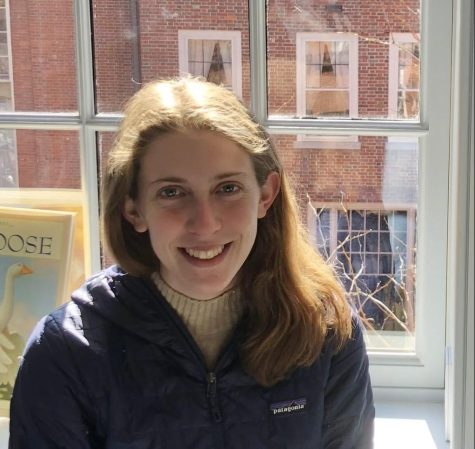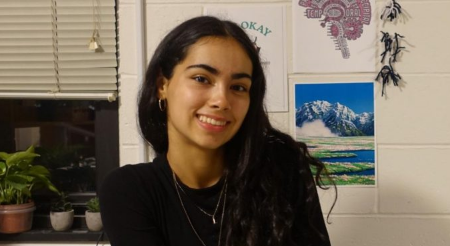At the Parent Information Center, a converted Victorian house on Main Street, families with small children wait in chairs lining the front hallway, chatting in multiple languages. In the front office, colorful multilingual flyers hang on the walls, and more families sit there. The phone rings behind the desk. A daughter translates for her father as the two of them talk to a registrar.
At the Parent Information Center (PIC), families enroll their children in the Worcester Public Schools. Many receive English screenings, too, or meet with the nurse to get updated vaccinations. Students at PIC come from many countries and circumstances; some haven’t been able to go to school in many years. However, at PIC, they go back to school.
Registration
Most parents enrolling their children in the Worcester Public Schools will visit PIC, as all students in kindergarten-sixth grade must register there, in addition to all multilingual students and students with Individualized Education Plans. And while parents can register their children online through the Worcester Public Schools website, multilingual students should still visit PIC in order to receive a screening for their English abilities. This screening will allow students to be placed in the appropriate classes at school.
On the first floor of PIC, families meet with one of the three registrars. Combined, the registrars see around 15-30 students per day, according to Student Assignment Officer Sue Obiero, who leads the registration department. Registrars ensure that families have all the necessary information to enroll their student, including the student’s birth certificate or passport, up-to-date vaccinations, and a Worcester residence.
Some students are missing vaccinations, however. Then, they and their families can visit Karen Allaway, the nurse stationed at PIC. “We have a very unique program [here],” said Ms. Allaway, “which is that we have all the required vaccines.”
Both refrigerated and frozen vaccines are kept in Ms. Allaway’s office, meaning that students can receive vaccinations while they are still at PIC. Ms. Allaway sometimes administers as many as 40 vaccines during a day.
Children born in the US, Ms. Allaway said, typically have received 20 vaccines by the age of 5. Therefore, for students with incomplete or no vaccine histories, there are a lot of vaccines to receive. Sometimes, students’ families must make follow-up appointments at PIC to finish receiving vaccinations; in other cases, school nurses can administer vaccines at the student’s school.
After meeting with a registrar on the first floor, potential English Language Learner students go to the second floor of PIC for English screening. On the second floor, there is a waiting room with games and picture books—other rooms on the floor serve as screening rooms.
Nelsey Peppler is the Systemwide Department Head of the Office of Multilingual Education. She and her staff of six screeners are responsible for screening new students for their English abilities. Ms. Peppler estimated that 10-20 students are screened per day. While screening is not required in order for students to enter school, it is preferable to do it ahead of time, so students’ schedules can be created more accurately.
The screening is divided by age, with different tests for different grade spans. Generally, there are four components: listening, speaking, reading, and writing. Screenings can take anywhere from 30 minutes to 2 hours, explained Ms. Peppler, “depending on how much English the student knows.” If a student doesn’t know much English, the screening process is quicker, because there is less fluency to test. The information determined from the screening can be used to place students in appropriate classes at school.
Increasing Enrollment
Worcester is a high-incidence district, meaning it receives a lot of new students, so PIC is a busy place—and it has only been getting busier. Ms. Obiero and Ms. Peppler have seen an increase in enrollment there, especially after COVID, when movement for many people was limited. Even from July 2023 to the middle of October 2023, Ms. Obiero estimated that 500 immigrant students alone had enrolled at PIC.
“I don’t think it’s going to slow down anytime soon,” added Ms. Peppler.
Families in Worcester come from a variety of new places. For example, there have been many Haitian immigrants to Worcester this year, due to turmoil there, said Ms. Obiero. Last year, they noticed more Brazilian immigrants coming to Worcester, and a couple of years ago, there were more Afghan immigrants, because of conflict in Afghanistan. Additionally, the Worcester Public Schools works with refugee agencies to help refugees coming from places around the world.
Part of the increase in enrollment results from friendlier national immigration policy under the Biden Administration, including less harmful rhetoric about immigrants, said Ms. Peppler.
Beyond that, Ms. Obiero said, with inflation affecting people’s lives around the world, more people may be thinking, “‘Okay, when we go to America, we’ll live better.’”
However, in addition to immigrants, people move to Worcester from other places in the country, like New York City and Boston, said Ms. Obiero. Ms. Peppler said that some parents she sees at PIC work in hospitals or labs in Worcester.
As more students enroll in the Worcester Public Schools, PIC and the Worcester schools must communicate more—ensuring that students’ paperwork is correct and that their situations are understood.
Sometimes, this can be frustrating, said a guidance counselor at South, who wished that communication between PIC and the school could be more efficient. On both sides, though, the end goal is that students are able to successfully attend school.
Serving Students
Many students begin school the day after they enroll at PIC, which Ms. Obiero and Ms. Peppler see as beneficial, because it gets them in the classroom as soon as possible.
Overall, PIC is able to serve students and families in Worcester, including many underprivileged students and students with interrupted educations.
Homeless students, for example, can have a more difficult time enrolling in school, because they might be missing documents needed to register. However, the McKinney Vento Act, passed in 1987, protects homeless students’ right to education. Under the McKinney Vento Act, school districts must allow homeless students to attend school, regardless of whether they have the necessary documents. School districts then work with families to acquire any missing documents.
“We have a lot of families in Worcester who live with another family or relative because they’ve lost their home,” said Ms. Peppler. “They have to be allowed into school.”
Additionally, some students who enroll at PIC have had inconsistent education, for a number of reasons.
For example, in some countries, girls cannot go to school once they reach a certain age. When families from these countries arrive at PIC, Ms. Obiero and Ms. Peppler are enthusiastic to explain that girls attend school in the US.
“They’re just so happy to have the chance,” said Ms. Peppler. “They’re like, ‘We can go to school with our brothers?’”
In other cases, students might have missed part of their education because there was a fee to attend school, which they could not pay. Or, Ms. Obiero explained, some students stopped going to school, so that they could work and support their families.
When students ages 8-21 have “at least three years of educational gaps,” or little-to-no formal education, they qualify as students with Significantly Limited and Interrupted Formal Education. Then, they can participate in city-wide programs through the district’s New Citizen Center, according to their age group. This allows them to continue their education in a space designed for the transition they are undergoing. Afterwards, they progress to their home school or another program.
In all cases, Ms. Obiero and Ms. Peppler care about their ability to offer an education to new students in Worcester. “[PIC] is the first face [in Worcester] that these families see,” said Ms. Peppler.
“I am very passionate about multilingual learners and the opportunities we must give them,” added Ms. Peppler. “I think Worcester has an incredible opportunity to provide services and programs for multilingual learners. . . . I think that’s really important.”
“We take school very seriously here,” said Ms. Obiero. Sometimes she encounters students who are scared of going to school, because they are unfamiliar with English. However, Ms. Obiero values the ability to show these students that they can succeed, despite the challenges they are facing.
At PIC, families and students begin an educational journey, which will affect many parts of their lives and provide them with new opportunities.
“It’s pretty amazing,” said Ms. Peppler.







